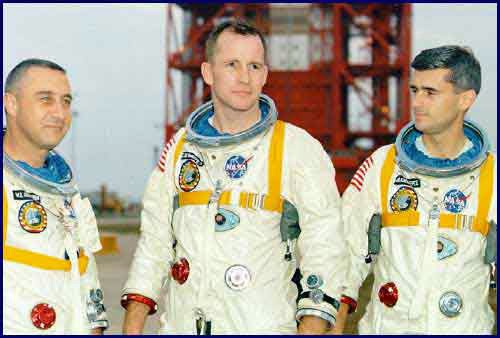"An Act to provide for research into the problems of flight within and outside the Earth's atmosphere, and for other purposes."
NASA was established as a civilian agency responsible for coordinating America's activities in space. On July 29, 1958, its creation was secured with the signing of the National Aeronautics and Space Act by President Dwight D. Eisenhower. NASA's establishment further equipped the United States for leadership in the space age.
The establishment of the National Aeronautics and Space Administration (The Birth of NASA) solidified the United States' commitment to winning the "race in space" against the Soviets. NASA's involvement occurred in response to the Soviet Union's October 4, 1957 launch of its satellite, Sputnik I, the first satellite to orbit the earth bringing about the dawning of the space age. Its launching became known as the "Sputnik crisis", which prompted attention of the United States to turn toward its own fledgling space efforts. The new agency became operational on October 1, 1958.
NASA thus became synonymous with the space race. It was the driving force that brought to reality what was once only envisioned in a sci-fi movie. What makes NASA even more intriguing are the events that followed within the next 56 years: Some ecstatic, others traumatic.
~~~~~~~~~~~~~~~~~~~~~~~~~~~~~~~~~~~~~~~~~~~~~~~~~~~~~~~~~~~~~~~~
A Walk on the Moon
In May 1961, President John F. Kennedy announced that the United States should set a goal of putting a man on the moon by the end of the decade. Eight years and billions of dollars later, Neil Armstrong stepped out of the lunar module Eagle and onto the moon's surface on July 20, 1969.
The great space race was over.
~~~~~~~~~~~~~~~~~~~~~~~~~~~~~~~~~~~~~~~~~~~~~~~~~~~~~~~~~~~~~~~~
Travel into Space
The astronaut program at its inception consisted of male candidates, that is in the United States. Soviet Cosmonaut Valentina Tereshkova traveled into space aboard Vostok 6 on June 16, 1963. As the US program expanded, so did its candidacy. Almost twenty years to the day after the first woman in space, Dr. Sally Ride, a mission specialist, joined the Challenger shuttle mission on June 18, 1983 becoming the first American woman to complete the same feat.
 |
| Sally Ride communicates with ground controllers from the flight deck of Space Shuttle Challenger during her first mission in space, STS-7. (Photo by NASA) |
NASA Remembers Three Space Tragedies
With any successful program lies the possibility of tragedy. NASA has not escaped such horrific events. The end of January marks a somber time for NASA with the anniversary of three major tragedies int he history of U.S. spaceflight, each of which left a nation stunned but did not kill the spirit of exploration. Despite the risks, astronauts continue to risk their lives...in the name of adventure, exploration, and discovery.
Jan. 27,
1967
Jan. 28, 1986
Feb. 1, 2003
~~~~~~~~~~~~~~~~~~~~~~~~~~~~~~~~~~~~~~~~~~~~~~~~~~~~~~~~~~~~~~~~
Date: July 29, 2014 -- 7:47 p.m. Eastern
Mission: Automated Transfer Vehicle-5 (ATV-5)
Description: The European Space Agency’s fifth Automated Transfer Vehicle (ATV-5), named “Georges Lemaître” in honor of the Belgian astronomer and physicist, will launch from Kourou in French Guiana to deliver cargo and crew supplies to the International Space Station.
The Congress hereby declares that it is the policy
of the United States that activities in space should be devoted
of the United States that activities in space should be devoted
to peaceful purposes for the
benefit of all mankind.








No comments:
Post a Comment